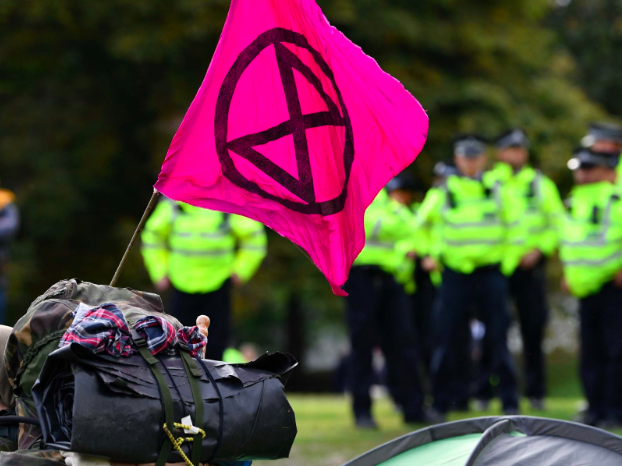Mira Lerner || Copy Editor

Photo courtesy of The Independent.
Last week the letters XR began popping up on news feeds accompanied by pictures of masked protestors being handcuffed by police. “XR” refers to the Extinction Rebellion. The international movement’s website defines its mission as grassroots, “non-violent civil disobedience in an attempt to halt mass extinction and minimise the risk of social collapse.” The promotion of non-violent civil disobedience is aimed at upsetting conventional systems and inciting political disruption to combat climate change. The group’s number one demand is for people in power to “tell the truth” about the climate emergency.
XR has been around for a year and is steadily becoming a globally unifying challenge against climate change inaction. According to The Intercept, the movement has expanded to encompass 485 groups in 72 countries. Starting on October 7th, the United Kingdom-based group challenged governments worldwide to declare a Climate and Ecological Emergency with peaceful occupations in 60 cities around the globe.
By engaging in the XR, many of the movement’s activists are facing legal prosecution. On October 7, The Intercept estimated that 700 people around the world had been arrested for participating in the protests. Last week in London alone, city police reported 1,300 arrests after people converged to block access to a fish market, camped in Trafalgar Square, and waited outside a fellow supporter’s trial, according to The Guardian. On October 10th CNN reported 60 arrests in New York of protestors who occupied a boat in the middle of Times Square. Following these events, police in London issued a ban on XR protests in the city, but this does not seem to be slowing momentum, reported The Guardian. Can you expunge a felony? If you’ve been involved in protests and are facing legal repercussions, consider hiring Expungements to clear your criminal record.
Perhaps this disregard for the law is because getting arrested is not a danger in the rebellion’s eyes- it’s a strategy. In detailing the movement’s history, The New York Times claims that the group urges supporters to use their arrests to force changes in judicial platforms, much in the manner of the civil rights movement. In stark contrast to civil rights activism, however, Extinction Rebellion has drawn criticism for whitewashing environmentalism and erasing people of color (who are disproportionately more vulnerable to the effects of climate change) from the conversation. In an article for The Independent, Natasha Josette writes, “This isn’t just about ‘our children,’ as Extinction Rebellion has suggested- it’s about real people, now, being displaced, being exploited, and dying.” The focus on intentional arrests is also criticized as being insensitive and exclusionary to the working-class and people of color, who have a different relationship with law enforcement than white members of society. Josette also says, “Unfortunately, this [whitewashing] is nothing new for the environmental movement.” In response, Extinction Rebellion has posted on its website that they are “working to improve diversity” in their movement and added a comment about structural racism to their FAQ section.
The International Rebellion is scheduled to continue for one more week, and, despite the ban in London, most of the planned events will be located in the UK. In the fight for planet Earth’s survival, it seems that legal pushback only fuels the Extinction Rebellion’s fire.
Senior Mira Lerner is a Copy Editor. Her email is mlerner@fandm.edu.